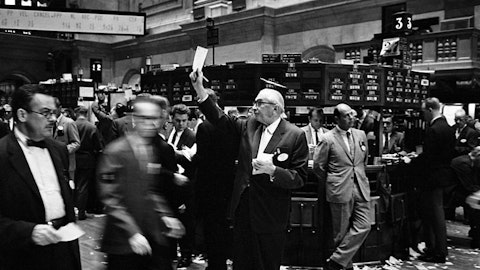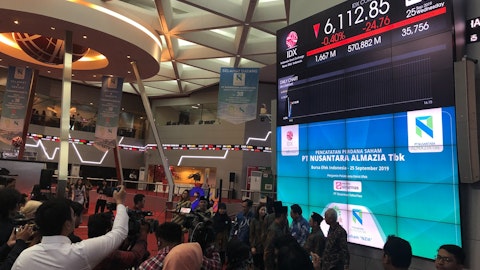Mike Grau: Thank you, Daniel, for the questions. Appreciate it. In terms of bookings, I think you have to look at that really in two parts. I think the arena and the theaters are slightly different animals in that regard. With the Arena, we’ve talked historically and still relatively — still the case. The booking window tends to be about six to nine months out. So we do have enhanced visibility there. As we look at fiscal 2025 and the kind of the number of shows we have booked now versus the same point a year ago for fiscal 2024, I would say we’re up mid-single-digits for the full year 2025. And if I were to look at just the first half of 2025 probably up more like low-double-digits in terms of number of events. So, pretty encouraged by the current trends in terms of bookings on the arena.
On the theaters, the booking window is a little shorter three to six months. So the pipeline is a little less developed and the visibility is not as good. Nevertheless, if we look at it the same way, we are up high-single-digits versus the prior year in terms of events booked at the theaters at this point in time. So look, we’re coming off what will be a record year in fiscal 2024 in many respects as to event volume. We’re still pacing very nicely versus that record year. In regards to your second question, in terms of softening of consumer spending and demand, and you referenced McDonald’s and Starbucks, we’re not really seeing that. We see that on a couple of different data points that would support that. Most of our shows continue to sell out.
For our fourth quarter shows, we’re pacing ahead of the prior year in terms of our sell-through percentages versus where we were again same point last year. We still have a lot of apps that are selling, that are adding additional shows because of demand. So in terms of events and tickets, the demand is very healthy, which supports just what we’re seeing in the live experience sector in general both here and amongst our peers. In terms of the per cap spending on food and beverage and merchandise, we are up low single digits versus the prior year for concerts. That’s actually most notable would be arena, which is where the biggest opportunity is. The per cap spending of the Arena outpaces the theaters for a variety reasons and we’re seeing even more robust growth there.
So we’re not really seeing a softening demand average. I would speculate that we enjoy certain tailwinds that I think maybe McDonald’s and Starbucks don’t in terms of again the kind of the burgeoning popularity of live experiences and the continued return of New York City tourism from the pandemic. So by virtue of that we are not seeing that kind of softening of demand.
Daniel Duran: Got it. Thank you, very much.
Operator: The next question comes from the line of Peter Henderson with Bank of America. Please go ahead.
Peter Henderson: Yes, good morning, and thank you for taking the question. Just wondering, if you can help us sort of think through the size of the potential benefit from extended run for both the Knicks and Rangers in the playoffs? And then also, just how much or how deep of a run for both teams is already contemplated in your guidance. Thank you.
Mike Grau: Thank you Peter for the questions. Appreciate it. So in terms of the benefit of an extended playoff run for the Knicks and Rangers, arena licensees as you’re aware, Arena license fees I’m sorry we had a little noise — arena license fees as I think you’re aware under our fixed, but there are certainly variable revenue streams that we participate in and share with our partners at Sports. I’m talking about things like food and beverage, merchandise, single events, suite sales. So each event is incremental in that regard. As well as on a more macro basis, I think the team’s success can drive attendance and renewals on a go forward basis. So our interests are very much aligned with the Knicks and Rangers in that regard.
I mean look where New York based company, we’re New York centric company, what’s good for New York is going to be good for us over the longer haul, as well as in terms of short term economics. We do enjoy those variable incremental revenue streams. The flip side of that coin would be on the booking side. That’s something we’ve become pretty experienced and adept at in terms of managing, potential conflicts, working with the league, working with artists and manage kind of optimizing scheduling. I think this week is a great example of that, right? We’re just coming off a run of four consecutive days of home playoff games. And tonight, we’ll have Billy Joel at the Garden. So that’s just one data point to show, how we’ve managed to enhance flexibility around that.
So you see that the Knicks and Rangers go on an extended run and world hopeful and optimistic that that will be the case. There could be a small subset of shows at risk and buyout risk, I mean at risk of being pushed into fiscal ’25 and we’ve actually managed to hone that down to the point where the number of shows and question is really around low single digits. As your second question is, I’m not going to get specific on what’s baked into our internal forecasts in terms of number of rounds. I’ll just say that, our guidance encompasses, I mean the range of our guidance encompasses all these types of scenarios as far as how far the Knicks and Rangers go out. We would not change guidance for any of those outcomes.
Peter Henderson: Thank you.
Operator: Next question comes from the line of David Karnovsky with JPMorgan. Please go ahead.
David Karnovsky: Maybe just following up on that last point. I’m curious, you know, how many days in general does the Arena keep on hold when it does its planning process it may not hold for the playoffs. And what does the optionality to look at on a short term basis that those gains are in play recognizing this is less of an issue this year. And then following up on capital allocation, you noted the share authorization and I wanted to zero in on what circumstances would lead you to cash it restarted buyback? Thank you.
Mike Grau: Sure. So thank you, David for the questions. What I’m going to do is, I’m going to take your first question and then I’m going to ask Phil D’Ambrosio, our Treasurer who is with us to address your question on capital allocation. In terms of how many days we keep on hold, I’m probably not going to get into specifics other than to say, we generally have a kind of one and half, two-month window which is a playoff window for both hockey and basketball where we’re again managing it in the manner I described earlier. We continue to book acts. There’s certain language in the contracts for Axon this time day and date subject to change that kind of thing. We remain in constant contact with the league, with the sports teams with these acts in order to manage.




